Robin Barfield gives you some pointers on how to answer a tricky question

I’ve mentioned before that my children and the children I minster to ask the most brilliant questions. Questions that can be from such an unexpected perspective that it leaves us as parents flummoxed. If the last question Does Jesus Eat in Heaven? was hard to handle, their follow-up was even tougher: Will we wee and poo in the new creation?
It sounds like a similar question to the last but ends up touching on several different issues which have wider implications than an initially cute sounding question might imply. It would be so easy to dismiss this sort of question as either flippant silliness or a red herring from the more important issues which should be spoken of. Yet the question can be turned around to begin to explore the nature of our lives now and draw us to wonder at how marvellous our future hope is.
My first response was to ask them the question back. This was not to gain thinking time (although it helped) but to get them to begin to work through the question for themselves. The discussion then morphed in the following directions:
1. Is ‘Yuck’ sinful?
Finding something ‘yucky’ does not mean that it is necessarily wrong or sinful or even a result of the fall. We are told that Adam and Eve were given food before the fall (Gen.1:29); it is possible that there was some pre-fall way of getting rid of food waste but that seems unlikely, and we are not told of any change in the digestion system in Gen. 3. It would therefore seem probable that it was somehow part of the original good creation, and we see God’s provision of flora and fauna that break down food waste and recycle it back into nature.
Although God gives us a conscience to sense what is right and wrong, He ultimately decides what is sinful and what is good and shows us in His Word. Our feelings around bodies and bodily functions should not always define God’s will. Talking through this question with our children can give them a healthy thankfulness for the bodies God has given them and how He has caused them to work wonderfully.
2. What are the similarities and differences between this world and the new creation?
Whilst that may be a simple, even simplistic first point, when we move on to think about the age to come it gets more complicated and more wonderful. What will be the continuities and discontinuities between this age and the age to come? We know that there will not be marriage (Matt. 22:23-33) but that is because there will be a greater marriage between Jesus and the church. Everything will be far greater in the world to come, and the highlight will be that we will feast with the King (Rev. 19:9). If feasting is the highlight, it would seem strange to say that we will not wee and poo in the new creation. However, it is so beyond our imagination it is quite possible. The new creation will far exceed our expectations and drawing our children into the wonder of the future is a glorious opportunity.
Not all questions our children ask need to be answered comprehensively or even definitely. Some can be left open to encourage our children to marvel at how much greater God is than us as well as helping them long to be there, to long to discover more and to long for the day when they can ask God face-to-face.







































